
On Tuesday, 6 March, in Paris, the capital of France, Zanda Kalniņa-Lukaševica, Deputy Speaker of the Saeima and head of the Latvian delegation to the Parliamentary Assembly of the Council of Europe (PACE), was elected Chair of the PACE Committee on the Honouring of Obligations and Commitments by Member States of the Council of Europe (Monitoring Committee). Kalniņa-Lukaševica is the first representative from Latvia to become leader of the Committee.
“Assuming the leadership of the Monitoring Committee for the next two years is an enormous responsibility. The Committee has a special role in safeguarding democracy, human rights, and the rule of law in member states of the Council of Europe. I thank my colleagues for placing their trust in me,” said the Deputy Speaker of the Saeima.
The Committee is responsible for verifying the fulfilment of obligations assumed by member states and their authorities under the Statute of the Council of Europe (CoE), the European Convention on Human Rights, and all other CoE conventions to which they are parties. Member states are obliged to fully cooperate with the Monitoring Committee in fulfilling this objective.
The system was established to assist CoE member states in honouring their commitment to upholding the highest standards of democracy, human rights, and the rule of law. The Monitoring Committee assesses whether each member state ensures free and fair elections and evaluates the legal framework establishing equality before the law and access to justice. In addition, the Committee promotes the combatting of all forms of discrimination and fosters mutual cooperation among member states.
If a member state fails to ensure the highest standards of democracy, human rights, and the rule of law, based on reports prepared by the Monitoring Committee, there are several possible courses of action for PACE. In the event of major violations, the Committee can make recommendations, restrict the participation of the member state’s delegation in PACE, or, in more severe cases, propose to expel the state from the Council of Europe. PACE’s assessment impacts the credibility and reputation of its member states on a broader scale.
Until 7 March, Kalniņa-Lukaševica is taking part in the work of PACE’s Committee on Political Affairs and Democracy, Monitoring Committee, Bureau, and Standing Committee in Paris, France. The Council of Europe has 46 member states and six observer states. CoE states are represented in PACE by members of their national parliaments.
Additional information:
The PACE monitoring procedure works in four ways. The full monitoring procedure involves regular visits to the member state by a pair of rapporteurs, who conduct an ongoing dialogue with the authorities, and, where necessary, plenary debates to ensure that the state’s progress and problems are assessed fairly. This currently applies to eleven states (Albania, Armenia, Azerbaijan, Bosnia and Herzegovina, Georgia, Hungary, the Republic of Moldova, Poland, Serbia, Türkiye, and Ukraine).
States that have made progress may pass on to post-monitoring dialogue, a less intensive procedure involving a limited number of remaining issues. This currently applies to three states (Bulgaria, Montenegro, and North Macedonia).
In addition, the Monitoring Committee is charged with preparing regular periodic reviews on all CoE member states neither under a full monitoring procedure, nor engaged in post-monitoring dialogue. The order and frequency of these reports are decided by the Committee. Currently, the Committee is preparing periodic review reports on Greece, the Netherlands, Spain, and Sweden.
Finally, the Committee can prepare a report on the functioning of democratic institutions in any member state when particular developments warrant.
The Monitoring Committee was established by PACE in 1997. It consists of 93 members appointed by the Assembly’s political groups. Committee meetings take place six to eight times per year in Strasbourg during the PACE plenary sessions, or in the CoE headquarters in Paris or one of the member states between sessions.
Latvia joined the Council of Europe in 1995. The monitoring procedure for Latvia was started in 1997. The final post-monitoring dialogue report on Latvia was prepared in late 2005, and the post-monitoring procedure concluded in January 2006.
Saeima Press Service







